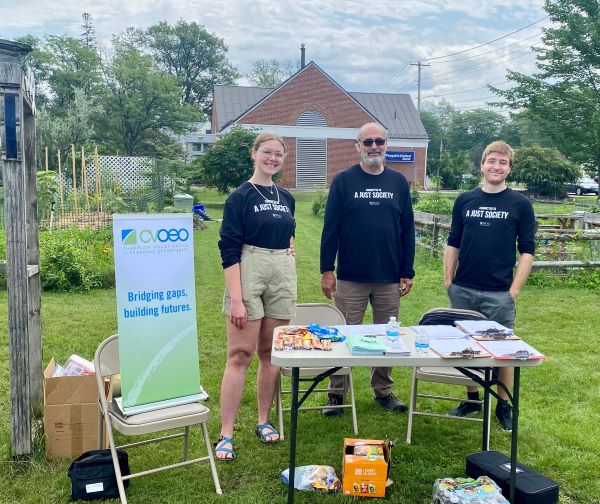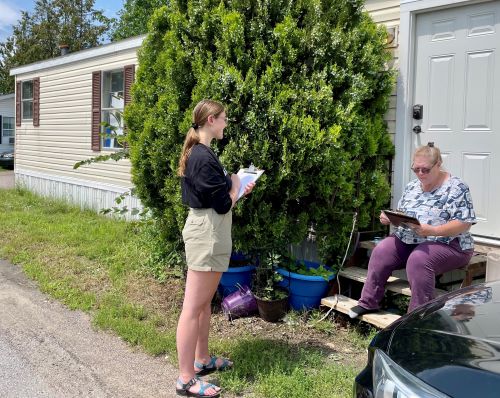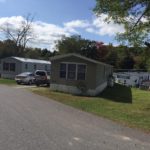
*This is an excerpt from Michelle Morgan’s final report on her summer internship with CVOEO‘s Housing Advocacy Programs (HAP). Michelle is a sophomore at Washington and Lee University. This summer, she worked primarily with the Mobile Home Program and assisted with other HAP activities. We are grateful for her thoughtful and enthusiastic approach to the work and for the contributions she made to the HAP programs during her internship.*
By Michelle Morgan
Shepherd Higher Education Consortium on Poverty (SHECP) Intern
I came into this internship knowing close to nothing about the intersections of poverty and manufactured housing – but I did come into this internship eager to learn; though I’ve never lived in a mobile home myself, I grew up in a rural, agricultural area of the country where they are a significant source of affordable housing. I was quick to find out during my first few days in the Mobile Home Program that mobile homes make up a significant source of affordable housing everywhere, which was only surprising to me in the sense that I was shocked at the lack of recognition they receive as such. Through working and talking with my team members, reading the 2018 Esther Sullivan ethnography Manufactured Insecurity, and engaging in directed research on state and local legislation regarding mobile homes and mobile home parks, I am happy to say that I will close this internship with a heartfelt understanding of the incredible importance of manufactured housing – not only when pertaining to low-income populations themselves, but in conversations regarding the affordable/fair housing crisis at large, and what solutions or pathways can be undertaken to help resolve it.
I am fortunate to have been able to gain this understanding at CVOEO in the state of Vermont, which I’ve come to know is on the vanguard of mobile home rights, regulations, and tenant-landlord responsibilities. Elsewhere in the country, and indeed in some parts of Vermont, mobile home residents live in a limbo between homeownership and land rentership, leaving them highly vulnerable to park sales, evictions, and rampant lot rent increases. The nature of manufactured housing also creates a limbo between permanence and mobility: many ‘mobile’ homes are actually immobile, with either structural deficiencies making them impossible to move without falling apart, transportation services costing thousands of dollars, or the straightforward issue of simply not having another lot to move the home to. On the converse, the ‘mobile’ aspect of manufactured housing often creates a fractured or unstable sense of ‘home’ and permanence that is essential to secure housing, while at the same time isolating mobile home parks and residents from the rest of the community due to structurally reinforced stigma and preconceived, stereotype-enforced bias against manufactured housing and the people that live in it.
Vermont, however, is unique in its recognition of the importance of mobile homes as a source of affordable housing security, with a variety of laws and regulations in place to prevent exorbitant rent increases and surprise park sales; the state, in coordination with organizations such as CVOEO and the Cooperative Development Institute (CDI), supports and offers help with the transition of parks from private to cooperative or nonprofit ownership, in which the park becomes owned by either the residents themselves or a housing trust. But this certainly does not mean that Vermont is perfect when it comes to protecting and empowering mobile home residents. I found this out within my first week or so of working here, through calling residents on the phone to have them complete a survey. While guiding residents through this survey over the phone, I heard time and time again concerns surrounding lot rent, community leadership and organization, quality of life, and long-term sustainability of the park in the market and in the community at large. Keep in mind that the residents I contacted lived in cooperatively-owned parks, which are considered to be the crème de la crème of mobile home communities in regards to resident advocacy and empowerment. So, I witnessed firsthand, right off the bat, that there remain miles and miles of progress to be made before fair, affordable, and secure housing is accessible and enjoyable for all.
I am more honored than anything to have been able to spend my summer contributing to closing that gap, even if only in small baby steps. Keeping in contact and conversation with my Shepherd Program Professional Learning Community (PLC) cohort, I recognize that I was incredibly fortunate to be able have an in-person internship, and that this aspect was crucial for the amount of agency involvement I was able to have, as well as the level of community involvement and engagement I experienced while living and working fully immersed in the greater Burlington community. Here are some of my proudest accomplishments from my time at CVOEO:
- Expanded on the Mobile Home Program’s Civic Engagement & Emergency Preparedness Pilot Program by developing a Community Outreach Plan for the project’s second phase, which ultimately aims to build community cohesion and relationships.
- Helped complete the final version of the first-phase project report.
- Created a data-driven map on Google Earth Pro of all mobile home parks in Vermont as listed on the state registry, including the nature of ownership, park size, lot rent, and owning body.
- Wrote a resident survey for preliminary feedback collection at parks, intended to gauge interest level for continued CVOEO involvement.
- Participated in on-the-ground community outreach, during which I went door-to-door with one of my supervisors and had the opportunity to have conversations with mobile home community members in person.
- Designed promotional materials for the Fair Housing Project’s Community Housing Discrimination Survey.
- Participated in a monthly discussion group with the Housing Advocacy Programs team about Keeanga-Yamahtta Taylor’s 2019 book Race for Profit.
All that I’ve learned about community, care, empathy, understanding, and action – within and without the workplace – has left an immense mark on my life: my story, my beliefs, my motivations, my passions, what drives me forward as a person. Here, in Burlington, through this internship, I’ve felt love, joy, kindness, generosity, compassion, warmth, and welcoming beyond what I could have ever imagined. I’ve been given the space and freedom to explore the depth and breadth of my capabilities both professionally and personally; my contributions have not been constrained by my status as merely “The Intern.” My coworkers and supervisors welcomed me into the team with open arms and cultivated a space and environment where meaningful, lasting work could come to be. My time in the Mobile Home Program has encouraged me to be the best person I can be, to do the best work I can do, to make the most difference I can make.
What I’m Coming Away With
My time at CVOEO has opened so many doors and illuminated endless opportunities in my life; it has changed my outlook on the world and the people that inhabit it; it has strengthened the values I hold dear to my heart, expanded on my personal abilities and professional skills, and illuminated my direction and purpose. Given that I’m still 18 years old, I think it’s fair to say that this internship – my first internship, something I never imagined would come along after only a year of college – has been my coming-of-age moment. Eight weeks of working in a nonprofit on the development and implementation of a project that has the potential to improve the livelihoods of mobile home park residents across Vermont, having my contributions acknowledged seriously and built upon, being able to go out into the community and interact with the people my agency serves – all of it, every little bit of it, has served to make it more clear than ever what I can accomplish, what I stand for, what I believe, what I find meaningful, who I am. It is, I believe, the true purpose of my existence to do as much good and spread as much positivity as humanly possible within my means. This internship has been fulfilling on a spiritual level, and has enabled me to dedicate myself to following my dreams and working toward the ultimate end goals of my life at large. CVOEO and the Mobile Home Program have taught me that not all the world is as bad as it may seem, especially during times like these. No, I can’t give up on humanity yet, because I’ve gotten to work with and know personally a handful of those people nationwide who dedicate their time and build their career around helping others. I feel blessed to have been a part of something so crucial to the integrity and empowerment of the Burlington community and beyond.
The Shepherd Higher Education Consortium on Poverty (SHECP) encourages the study of poverty as a complex social problem, by expanding and improving educational opportunities for college students in a wide range of disciplines and career trajectories. Through its programs, SHECP and its member institutions prepare students for a lifetime of professional and civic efforts to diminish poverty and enhance human capability, while also supporting connections among students, faculty, staff, and alumni engaged in the study of poverty.

